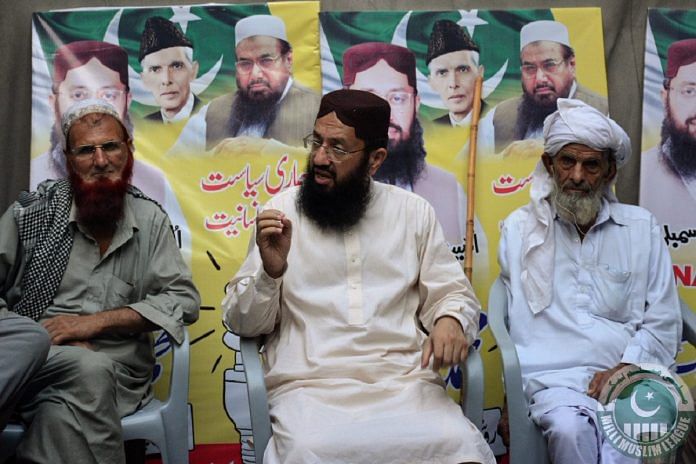Pakistan Army is working with a deliberate strategy get extremists and militants into the mainstream democratic process, but analysts say it’s a catch-22 situation.
At a time when Pakistan is in a state of political disarray, the country’s military has virtually confirmed that there is a deliberate strategy to encourage at least some militants and radical ideologues to participate in the country’s democratic process.
According to media reports, the Pakistani army last week said the government was discussing ways to make this possible.
This makes it rather obvious that the political debut of UN-designated global terrorist Hafiz Saeed’s political party, the Milli Muslim League (MML), in a by-election in Lahore last month was not accidental. It was part of a larger strategy, with the military seeming increasingly keen to bring Saeed and his ilk into the mainstream democratic process. Never mind that Saeed, the alleged mastermind of a string of horrific carnages in India and elsewhere, has repeatedly raged against democracy in the past.
“It is clearly an attempt by the Pakistani establishment to try and create a fig leaf for terrorist groups in the country,” said Arun Singh, former Indian ambassador to the US.
However, the development is hardly new. The Pakistani army, Singh added, had repeatedly used religious groups and parties to marginalise the moderate ones.
“They are only trying to ward off international pressure by finding ways to make them appear to enter the mainstream,” he said.
Pressure mounting
The Pakistani establishment has been under significant pressure from the international community to rein in extremism in the country. While on one hand, Washington’s hostile South Asia policy stares Islamabad in the face, on the other, even allies like Beijing have expressed concern about the security situation in Pakistan.
However, it seems unclear how bringing in erstwhile jihadi groups into the mainstream political process and discourse would ward off international pressure.
For sure, there is merit in de-radicalising militant outfits by bringing them into the democratic fold. It is both impossible and arguably unnecessary to lock up or kill all extremists. In fact, if the political transition is seen as inevitable for the Afghan Taliban, why can’t the same rulebook apply for Pakistan’s jihadi groups?
To most observers, the answer comes easily. Giving political legitimacy to extremists, without any declaration of abdication of violence by the groups, is an inherently fraught and questionable idea.
“We realise that it is a catch-22 situation for the government,” said senior Pakistani journalist and writer Owais Tohaid, adding that dealing with ubiquitous extremist ideology and ideologues was easier said than done.
“But on what basis are they being given permission to participate in democratic elections?” he asked, adding they had to surrender and explicitly state how they would divorce themselves from their violent ideologies.
Tohaid said if these groups entered the mainstream without giving up on their radical ideologies, “we as a nation will lose”. In future, if the state tried to curb their extremist activities, it would be termed undemocratic, he predicted.
Social implications
Strategic and political reasons apart, there are social implications of the strategy. Giving radical groups a political voice would inevitably lead to dissemination of their ideas, thereby normalising extremism.
Recently, in the aftermath of the Lahore by-election, which saw extremist parties win 11 per cent of the total vote, a popular actor in Pakistan congratulated Hafiz Saeed, praising him as a “righteous man”.
While the actor drew enormous flak for his statement from the country’s civilian elite, it remains to be seen if the broader public is in agreement.




Faction based deaths in Andhra have reduced to almost nil . Both the leaders have joined opposite parties and had to appeal to greater number of people.